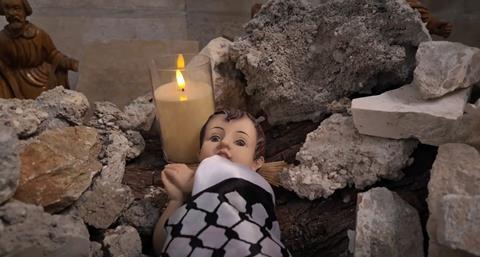Krish Kandiah travelled to Bethlehem in search of solutions to the current conflict

Bethlehem is closer than you might think.
This week it took me just eight hours to travel the 3,000 miles from London to the town where Jesus was born. That’s a fraction of the time it took Mary and Joseph to get there from Nazareth that first Christmas. But despite the progress the world has made in transport solutions, human suffering in that region remains just the same, with the political turmoil and feelings of hopelessness just as crippling.
I was in Bethlehem this week in search of a Christmas miracle. With no sign that a ceasefire between Gaza and Israel is currently achievable, I wanted to see if there were other ways peacemakers could play their part.
As I stood not far from the spot where angels appeared 2,000 years ago to declare “Peace on Earth”, the hope of peace could not have felt more distant.
Everyone I spoke to seemed to be traumatised with the ever more horrific reports emerging from Gaza. I heard about a doctor who was doing 25-30 amputations a day. I heard of women undergoing caesarean sections without anaesthetic. A seasoned worker with the International Red Cross told me that he had never seen anything like the devastation in Gaza anywhere in the world. A senior member of the clergy described the scene as a catastrophic massacre of terrible proportions. There is an urgent need for a cease fire.
the hope of peace could not have felt more distant
I looked for hope in the Church of the Nativity which is located at the end of Star Street, just off Manger Square. The entrance is so low that everyone must bow down to get in, ensuring that everyone who enters does so with humility, just like the wise men of old who came to visit the Christ-child. But the inside of this beautiful ornate building felt as devoid of hope as it was tourists.
A Palestinian Christian in Bethlehem told me: “We do not need your prayers. We can pray for ourselves. What we need is you to move.” She was asking for more than sentiment from the world as we watch what is happening on our televisions. She was asking for action. Many Palestinians I spoke to saw the UK’s abstention on the UN ceasefire vote as a betrayal. They want Christians to stand up for peace.
The attack on 7 October was horrific. The taking of hostages is also abhorrent. But the constant bombing and killing of civilian Gazans needs also to be condemned. Children, pregnant women, whole families are not acceptable collateral losses for bringing Hamas to justice.
The victims of this war see that their only hope is in a ceasefire, the release of captives and a humanitarian response to those who need our help as well as justice for those who have lost family members.
In a small Evangelical Lutheran church off the beaten track I found a pile of rubble. Looking more closely I saw that placed among the pieces of broken concrete was a doll representing the baby Jesus.
Dr Munther Isaac, the pastor of the church, explained to me: “In these difficult times let us comfort ourselves with God’s presence amid pain, and even amid death, for Jesus is no stranger to pain, arrest, torture, and death. He walks with us in our pain.
“God is under the rubble in Gaza. He is with the frightened and the refugees. He is in the operating room. This is our consolation.”
Dr Isaac is right. Jesus is the only one that can offer both sympathy and hope to the people of Gaza as they face Christmas with the constant threat of death and destruction.
But the doll in the rubble has a message for us too. Those of us with a Christian heritage can’t ignore the devastation. We have to show solidarity with the victims of injustice, just as Jesus did, the Prince of Peace who was born in a manger in Bethlehem and was killed despite having done nothing wrong.





































No comments yet